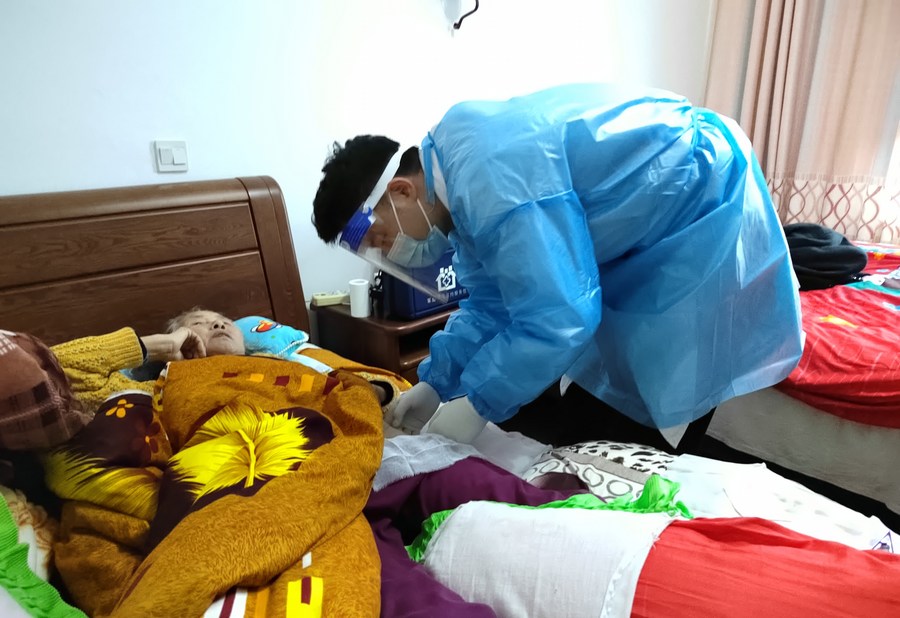[ad_1]

Rural doctor Hou Luobo treats a villager door to door in Youxian County, central China’s Hunan Province, Jan. 3, 2023. (Xinhua)
CHANGSHA, Jan. 3 (Xinhua) — Hou Luobo, 27, became a rural doctor in Youxian County, central China’s Hunan Province, in October 2019. About two months later, unprecedented challenges posed by a new virus, made for an unusual start to his medical career.
For the past three years, the main focus of his job was COVID-19 prevention and control. Now with China having optimized relevant COVID response measures, the priorities of his daily work have shifted to monitoring the health conditions of villagers and providing them with timely medical support.
“Compared with the intensity of doing mass nucleic acid testing, conducting door-to-door inspection and follow-up observation for people under quarantine in the past, the workload is less heavy now, but we still dare not slacken in our efforts,” said Hou.
Yanliang Village of Yajiangqiao Township, where Hou works, is located in a remote mountainous area administered by Zhuzhou City. With many young people working or settling in the city proper, most of the dwellers in the village are the elderly and children.
“Since we fine-tuned the measures for epidemic response, the villagers are commuting more frequently between these two places, so we need to conduct health assessments for key populations and provide classified services in a timely manner,” he noted.
Recently, the number of COVID-19 patients has increased visibly in Yanliang Village, and Hou receives about 80 outpatient visits every day.
“Some of the elderly are physically weak or have underlying diseases, and I will follow up on patients with chronic diseases or mobility difficulties and deliver medicines to their homes,” he said, adding that most of the patients in the village only have mild symptoms.
Hou is one of the millions of doctors and health workers in rural China who have long put down roots and safeguarded people’s health in the countryside.
Data from the National Health Commission shows that with the continuous improvement of the medical care capacity of primary hospitals — over 90 percent of patients in China’s countryside receive treatment at county-level hospitals — while rural doctors like Hou are the first line of defense against the virus.
In Dangcha Village, northwest China’s Ningxia Hui Autonomous Region, “shared medicine kits” are sources of great assistance to Hu Zhenglie, a village doctor.
Dangcha Village is home to over 800 residents, most of whom are left-behind elderly.
“Though the COVID-19 infection rate in rural areas is relatively light due to lower residential density, the demand for antipyretic and cough medicines has been high recently, because the residents here usually don’t stock medicine in advance,” explained Hu. “The ‘shared medicine kits’ initiated by the local Party branch have been a huge help.”
In Shagou Township, Ningxia’s Xiji County, the local government raised 4,000 tablets of antipyretics and dispatched them to families in need — free of charge.
Ma Hongliang, a villager in Shagou Township, had a family of seven infected with the virus a few days ago.
“There was no medicine at home. Fortunately, the doctor soon delivered antipyretics to us,” Ma said.
Official data shows that as of October 2022, a total of 19,400 fever clinics (outpatient clinics) had been built in township hospitals and community health service centers nationwide. Doctors at grassroots level have made tremendous contributions to China’s anti-epidemic fight over the past years.
Right after a heavy snowfall, Xiang Kaimin, a doctor in Shuanglong Township, Hunan’s Xiangxi Tujia and Miao Autonomous Prefecture, commenced his rounds of visits to local households.
“More people have recently returned home and the number of COVID infections is on the rise. However, we can only visit four families as of noon due to roads made slippery by snow,” said Xiang. “But I believe everything will get better, as spring will arrive soon.”
(Web editor: Cai Hairuo, Liang Jun)
[ad_2]
Source link



